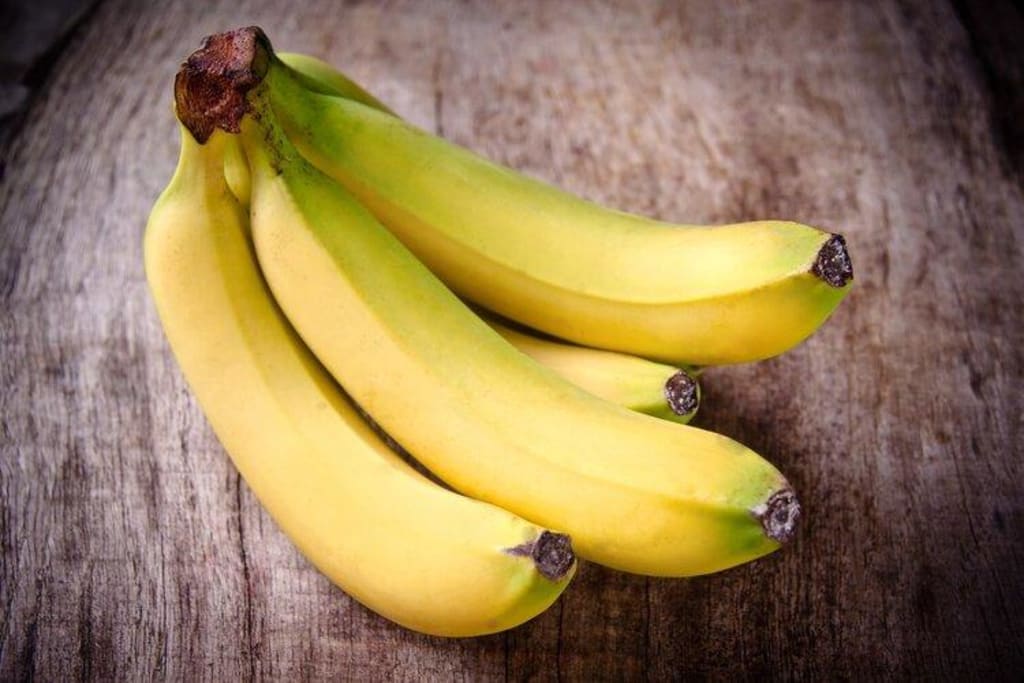Can eating bananas really lower blood pressure?
3 types of people attention, try to touch less bananas

"Eating that many bananas are nonsense!" The doctor shook his head helplessly.
The 45-year-old Uncle Zhang has been in good health, but his son is still not quite at ease and took him for a full body checkup a while ago. The result of the physical examination is nothing serious, but Uncle Zhang's blood pressure is a little high.
This makes him feel a pang in his heart, fearing that the blood pressure continues to rise to induce a major disease to appear. So he sought various ways to lower his blood pressure daily, and by chance, he heard that bananas are rich in potassium and that eating them can help lower blood pressure to some extent.
This makes Uncle Zhang like a treasure, On the same day to buys a bunch of bananas at home, they three meals a day to eat bananas, and more often than not, a day can eat four or five.
After eating like this for some time, Uncle Zhang found that his blood pressure did not drop, but rather the symptoms of stomach pain, bloating, and belching, went to the hospital and was diagnosed with chronic gastritis, and the "culprit" that caused him to suffer from gastric disease was his recent consumption of large amounts of bananas.
This uncle Zhang found it difficult to accept, not all say eating bananas can lower blood pressure. Why did his blood pressure not drop by eating bananas, but also caused the occurrence of gastric disease?
First, can eating bananas lower blood pressure?
Bananas are rich in vitamins and minerals. 100g of bananas contain about 60μg of carotene and are also rich in riboflavin, vitamin C, B vitamins, potassium, etc. Eating bananas can help the body replenish nutrients and have certain effects of protecting blood vessels, improving skin health, and enhancing brain power.
Is because bananas are rich in potassium, so there are rumors that they can lower blood pressure, and many people will eat a lot of bananas daily to prevent and control high blood pressure, but this practice is not recommended.

Bananas are indeed rich in nutrients, including potassium and magnesium, which are good for cardiovascular health, but eating bananas alone to prevent and treat hypertension is not a good idea.
The recommended reference intake of potassium within the dietary nutrients released by the Chinese Nutrition Society is 3600mg/day, and maintaining this amount of potassium intake can prevent hypertension. Take bananas as an example, 100g of peeled bananas contain about 250mg of potassium, to achieve the intake by eating bananas, you need to consume at least 4kg a day, about 11, which is difficult to do.
Even if you eat enough, it is also more detrimental to your health. Because of the high content of starch and sugar in bananas, a banana is about 1300 calories, a daily intake of such high calories will lead to excess body calorie intake, easily leading to obesity, and will increase the cardiovascular burden.
Relying on eating bananas to lower blood pressure is not reliable, and bananas can not replace antihypertensive drugs, which must have the right mindset.
Second, these 3 claims about bananas, do not believe again
In addition to the claim that it can lower blood pressure, there are many other rumors about bananas, follow the small wonder to see one by one.
1. bananas with long spots are toxic and cannot be eaten?
The rumors say that the bananas with long spots are with toxins or have been moldy, and eating such bananas can easily lead to body poisoning, which is not good for health.
There are two main reasons for the spots on bananas, one is that the epidermal cells on the banana skin are bumped by external forces or in a low-temperature environment, which will lead to the breakage of its cell membranes, and oxidation will occur after contacting oxygen, which will then produce black spots on the epidermis.
Secondly, the fungal disease can occur in bananas after infection with Prickly spore fungus, which will make black spots on the epidermis. However, this kind of germ is insulated from humans, and even if it enters the human body, it will not affect health, so there is no need to worry. When black spots are found on the epidermis of bananas, they can be eaten normally as long as the inner flesh is still normal.

2. Bananas have radiation and can cause cancer?
Rumor has it that bananas contain ionizing radiation, which is a cause for concern, and that long-term intake will lead to health risks.
The radiation contained in bananas is mainly related to the element potassium, which is radioactive, but the amount of radiation that can be radiated by potassium in bananas is not worth mentioning compared to the cancer-causing dose.
Eating a banana shell brings 0.0778 microsieverts of radiation to the body, while the radiation of a chest CT scan is equal to 70,000 bananas, so I believe we all have a mental picture of the amount of radiation brought by eating bananas.
3. Bananas that look yellow are hormonal
The rumors say that the all-yellow bananas sold in the market are ripened by using hormones, and the consumption of such bananas is very bad for health.
The normal ripening process of bananas is also from green to yellow, so it is not scientific to rely on the color of bananas to determine whether they are ripened or not. The color of the banana is yellow or green, and it does not affect the quality of the banana.
In addition, ripened bananas do not pose a health risk after consumption. Banana ripening is a common thing in the industry, which is usually preserved under suitable conditions and then ripened with ethylene glycol.
The substance is similar to the salt we consume every day, and using it to ripen bananas does not pose additional health risks.
Although bananas are good, they are not suitable for everyone
It is worth reminding that although bananas are rich in nutritional value, they are not suitable for everyone. For these three types of people, it is generally not recommended to eat bananas.
①People with poor stomachs and intestines
Bananas contain a certain amount of tannic acid, which will fuse with protein and dietary fiber under the action of stomach acid after entering the stomach, easily causing abdominal pain, bloating, nausea, and other symptoms, so it is recommended for people with poor stomach and intestines to eat as little as possible.
②Patients with kidney disease
Bananas are rich in potassium. For people with poor kidney function, a large intake of bananas can easily induce hyperkalemia, causing symptoms such as drowsiness, elevated blood pressure, and muscle weakness.
③Diabetic patients
The sugar content of bananas is high, and a large intake of bananas for diabetic patients can easily lead to a sudden rise in blood sugar, which is not good for the control of the disease.
Fourth, healthy eating bananas, these 3 points of knowledge to know
In life, there are certain skills to select bananas, and these three points are what everyone needs to learn.
1. There are skills to select
You should choose bananas with smooth surfaces, no trauma, and fruit shape, large and even. If you find that the peel is black and the stalk is black, it is not recommended to buy.
2. Pay attention to the consumption amount
The daily intake of bananas should be controlled by 1~2 bananas a day, and the above-mentioned special groups of people should reduce the intake again.
3. Preservation method
It is recommended to store bananas at about 13℃, which is less likely to turn black and will ripen more slowly. It is better not to buy a lot of bananas at one time, but to eat them as soon as you buy them.
Bananas are a very common fruit and can be consumed appropriately in life, but it is not scientific to try to cure diseases and lower blood pressure through bananas. About the right and wrong of bananas, do we all understand clearly?
About the Creator
Rachel Caspari
Life is just a series of trying to make up your mind.






Comments
There are no comments for this story
Be the first to respond and start the conversation.